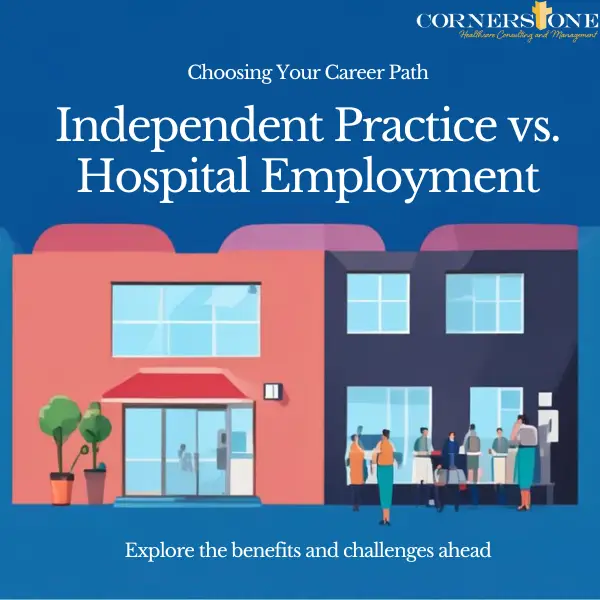Independent Practice vs. Hospital Employment: Pros and Cons for Physicians
As the healthcare landscape continues to evolve, many physicians are faced with a pivotal career decision: should they pursue independent practice or accept hospital employment? Each path comes with its own set of advantages and challenges. In this article, we’ll explore the pros and cons of independent practice vs hospital employment to help physicians make informed choices about their professional future.
Pros of Independent Practice
1. Autonomy and Control
One of the biggest draws of independent practice is autonomy. Physicians can make decisions about the services they offer, the staff they hire, and the overall patient experience.
2. Greater Income Potential
While overhead costs exist, independent physicians have the ability to scale their practice, set their own fees, and diversify income through additional services.
3. Flexibility in Care Models
Physicians can adopt alternative care models such as Direct Primary Care, concierge medicine, or integrative and functional medicine approaches.
4. Stronger Patient Relationships
With fewer bureaucratic constraints, physicians often enjoy deeper, more personalized relationships with their patients.
Cons of Independent Practice
1. Business and Administrative Burdens
Running a practice means managing staff, billing, insurance credentialing, marketing, compliance, and more—often without formal business training.
2. Upfront Costs and Financial Risks
Startup costs can be significant, and it may take time to become profitable. Physicians bear the financial risk of the business.
3. Limited Time Off
Time away from the practice can impact revenue, and coverage for time off may require hiring locums or cross-coverage.
Pros of Hospital Employment
1. Predictable Income and Benefits
Physicians receive a stable salary, benefits like health insurance and retirement plans, and potentially bonuses tied to performance metrics.
2. Reduced Administrative Burden
Hospitals handle billing, staffing, compliance, and other operational tasks, allowing physicians to focus more on patient care.
3. Work-Life Balance
Many employed positions offer regular hours, PTO, and coverage support, improving work-life integration.
4. Professional Development
Large institutions often provide opportunities for continuing education, research, and advancement into leadership roles.
Cons of Hospital Employment
1. Limited Autonomy
Employed physicians may have less control over schedules, treatment protocols, and the type of care they can provide.
2. Productivity Pressures
Compensation models often include RVU-based incentives that can lead to burnout and compromised care quality.
3. Vulnerability to Restructuring
Hospitals may reorganize, eliminate positions, or change service lines—impacting job security and physician satisfaction.
4. Potential Ethical Conflicts
Employed physicians may face pressure to prioritize institutional goals over individualized patient care.
Which Path is Right for You?
The choice between independent practice and hospital employment is highly personal and depends on your goals, risk tolerance, and desired lifestyle. Some physicians thrive in the entrepreneurial freedom of private practice, while others prefer the structure and predictability of hospital employment.
If you’re considering opening your own medical practice, working with a healthcare consultant can simplify the process—handling everything from credentialing to compliance so you can focus on what matters most: patient care.
Conclusion
The decision between independent practice vs hospital employment is one of the most important in a physician’s career. By understanding the pros and cons of each path, doctors can align their career choice with their values, aspirations, and ideal practice model.


